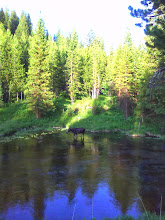Sometime during post-modernism, science became a religion.
It might be worth researching when and how this happened; it doesn't suit my purpose here. I do not mean to suggest that, since science has become a religion, science isn't true. I mean to point out that, just because something is suggested by a scientist ("top scientist" is the modern equivalent of "high priest" or "prophet"), it is not above scrutiny on grounds both scientific and non-scientific. Conversely, just because something is suggested by non-scientist, it is not beneath respect. Further, I am often troubled by the need in the humanities to find justification and funding for non-scientific disciplines by trying to turn them into sciences.
Let me illustrate my idea that science is a religion:
The King James New Testament defines faith as "the substance of things hoped for, the evidence of things not seen" (Hebrews 11:1). It has become an accepted practice in science for objects to be dated using radioactive isotopes, even when the decay rate of the isotope is far beyond the range of human corroboration. As the "evidence of things not seen," this qualifies as a principle of faith. Evidence in support of organic evolution, even to the point of attempts at detailed explanations of the origin of life, is "the substance of things hoped for," and is a principle of faith.
Writers casually use the word "miracle" in reference to evolution. (See http://science.discovery.com/convergence/miracleplanet/tunein.html.)
Morality is defined by the scientific necessity or validity of something. Abortion, for example, is either a valid method of ending a pregnancy or an invalid murder of a human being depending entirely on when a fetus becomes a human, and both pro- and anti-abortionists fight over scientific decisions of when a fetus becomes human. An appeal to non-scientific sources for the moral question is not considered valid. (See http://www.prochoiceactionnetwork-canada.org/articles/fetusperson.shtml.)
Orthodoxy is enforced. Psychiatrists who believe that homosexuality is a mental aberration, biologists who question even minor aspects of orthodox evolutionary teaching, environmentalists who question global warming--all are disciplined (if not shouted down), usually by being marginalized. Excommunication from the scientific faith in the United States is usually effected by the rejection of publication in mainstream American journals. (Since other cultures are not fighting a pitched battle against organized religious forces, they may be more willing to consider alternative evaluations of given data; in the United States, data are expected to be interpreted in certain orthodox ways; data that defy orthodoxy may actually be suppressed until a coalition is built to defend it.)
The phrase "studies have shown" has validity, in spoken American, equivalent to that formerly reserved for Biblical citations. (Google the phrase; it's interesting.)
Finally, science is funded by true believers.
There is a movement, organized or not, to discredit religion in general. In the United States, Muslim extremists are used as an excuse to do this, though all religions--including science--have crazy extremists who do not follow the basic tenets of most religions that govern how we get along with each other. Sometimes these extremists even get into power and are able to do great damage (note Joseph Stalin for scientific atheism and the Medici Popes for Christianity for two extreme examples). This marginalization of those who cling to religious beliefs is really intended to establish a hegemony of materialists, not as an establishment of a higher order of truth, as science should be.
Therefore, if science is the "the observation, identification, description, experimental investigation, and theoretical explanation of phenomena," then let it be so. Let it be an unbiased search for knowledge and truth, and be careful of the dogma.
Tuesday, December 30, 2008
Subscribe to:
Comments (Atom)
